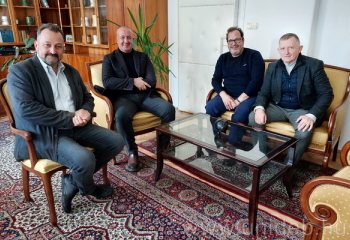The Centre International de Hautes Études Agronomiques Méditerranéennes (International Centre for Advanced Mediterranean Agronomic Studies – CIHEAM) supports the internationalization of the Faculty of Agriculture, Food Sciences and Environmental Management at the University of Debrecen (MÉK), as well as the expansion and strengthening of their foreign partner networks, according to a statement made during a visit to the university by a delegation from the professional organization representing 13 Mediterranean countries. Experts from CIHEAM Bari learned about the educational portfolio of MÉK and the research results of AKIT.
News
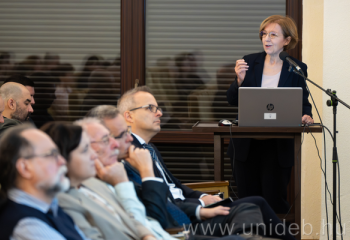
Researchers and industrial experts discussed the most recent scientific findings and possible future directions for further progress at the event titled Biotechnológia a Debreceni Egyetemen – 2025 Szimpózium [Biotechnology at the University of Debrecen – 2025 Symposium]. On Thursday, in the Debrecen Academic Committee Headquarters, participants learned about the latest international trends in addition to the research currently conducted at our institution.

Dr. Ildikó Horváth, Director of the Pulmonology Clinic and Professor of the University of Debrecen, will be serving for the next three years as Secretary General of the European Respiratory Society (ERS). The new leader was elected last year and she was formally inducted at the most recent conference of this European organization. She will be the first Hungarian professional to hold the high position of Secretary General.

Two researchers from the Faculty of Science and Technology at the University of Debrecen (DE TTK) gave a presentation in Japan at the Hungarian Pavilion at Expo Osaka on their efforts to save the Hungarian birch mouse, now on the brink of extinction.

BMW Group Plant Debrecen has recently expanded its strategic partnership with the University of Debrecen. The strategic cooperation between the German car manufacturer and our institution of higher education, which has been in effect since 2023, has been joined by the Faculty of Humanities as well as the unit Agricultural Research Institutes and Experimental Farm. The relevant agreement was signed on Tuesday by the leaders of the university and those of the company.
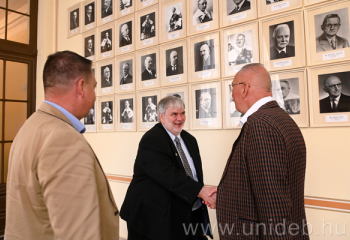
Rector of the University of Debrecen Zoltán Szilvássy and Dean of the College of Agricultural Sciences at Purdue University Bernard Engel have discussed the establishment of a joint food industry engineering program. The Wednesday meeting was also attended by Béla Kocsy, agricultural and food industry diplomat at the Hungarian Embassy in Washington, and Endre Harsányi, Vice Rector for Agricultural and Food Science Development.
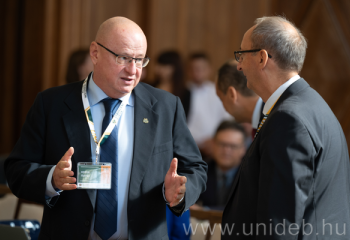
According to a report presented at the latest annual meeting of Scientific and Social Advisory Board (Tudományos és Társadalmi Tanácsadó Testület - TTTT), during the course of the past year, the University of Debrecen has covered a lot in the fields of education, science, and international collaboration. At the meeting, which was attended by several foreign professors, the members of the council could also hear about the achievements of the University of Debrecen and its objectives for the coming years.
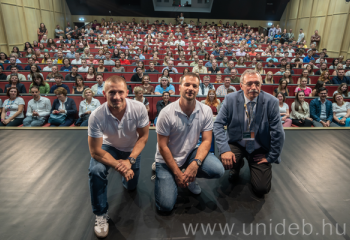
What does Client Gate have to do with Tibor Kapu becoming an astronaut? What could have silenced the otherwise rather talkative Shux and Tibor Kapu for six minutes on board the spacecraft named Grace? What does it mean in terms of space travel when a file upload gets stuck? These, among other things, as well as the process of becoming an astronaut and the special professional relationship between them were the topics discussed by research astronaut Kapu and astronaut candidate Gyula Cserényi in the theater hall of the University of Debrecen on Wednesday at an interview conducted by Vice Rector for Academic Affairs László Csernoch.
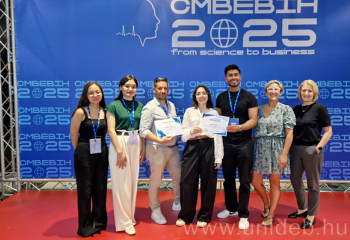
Team Veritas from the University of Debrecen won the international ideas competition OncoTrack Hackathon held between September 11 and 13, where staff members from Innovation Ecosystem Center assisted the Debrecen team on site.
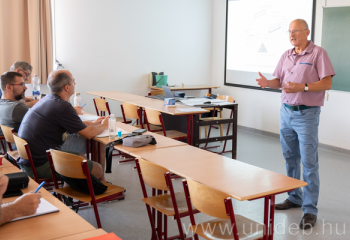
Count István Tisza Foundation for the University of Debrecen and the University of Debrecen recognized the work of researchers of the Faculty of Engineering of the University of Debrecen with a Publication Award for their efforts examining Newton's Law of Cooling and, among other things, further developing the statements of the physicist who lived 300 years ago through a formula that is more easily understandable than the one used so far. The researchers presented their findings in the International Journal of Heat and Mass Transfer.
